Maxwell James Merritt was a New Zealand-born singer-songwriter and guitarist who was renowned as an interpreter of soul music and R&B. As leader of Max Merritt & The Meteors, his best known hits are "Slippin' Away", which reached No. 2 on the 1976 Australian singles charts, and "Hey, Western Union Man" which reached No. 13. Merritt rose to prominence in New Zealand from 1958 and relocated to Sydney, Australia, in December 1964. Merritt was acknowledged as one of the best local performers of the 1960s and 1970s and his influence did much to popularise soul music / R&B and rock in New Zealand and Australia.

Dekadance is the title of two different collections of remixes by Australian rock group INXS: a 1983 four-track 12" and cassette EP released in the United States of songs from Shabooh Shoobah; and a 1985 seven-track cassette released in Australia of songs from The Swing. The latter included a cover version of "Jackson" as a duet by INXS' Michael Hutchence with Jenny Morris, their backing singer. This compilation peaked at No. 2 on the Australian Kent Music Report Albums Chart in April 1985.
"Evil Woman", sometimes titled "Evil Woman ", is a song by Minneapolis-St. Paul-based band Crow, on their 1969 album Crow Music. It reached number 19 on the US Billboard Hot 100 pop chart and number 65 in Australia.

"Love at First Feel" is a song by Australian hard rock band AC/DC. It is the second track of the international version of their album Dirty Deeds Done Dirt Cheap, released in November 1976, and was written by Angus Young, Malcolm Young, and Bon Scott. The international version was not released in the United States until April 1981.
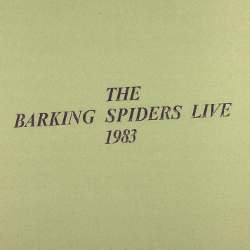
The Barking Spiders Live: 1983 is a live album by Australian rock band Cold Chisel. It was recorded during the final performances of their Last Stand tour in 1983, at the Sydney Entertainment Centre. The name of the album derives from a name the band used occasionally when playing warm-up shows before tours. Don Walker states a "barking spider" is "Scottish slang for a fart."

Take It Greasy is the debut studio album to be released by Australian 1950's retro band Ol' 55. The album peaked at number 3 on the Australian Kent Music Report and was certified 3× platinum. At the time, 1950s music and culture had gained a newfound interest in Australia amongst a younger generation, largely due to the influence of the very popular TV show Happy Days and earlier investigations into doo-wop by the group Daddy Cool.

Brian Cadd is the debut self-titled album by Australian musician Brian Cadd. It was released on the Bootleg Records label in 1972 and peaked at number 3 for three weeks on the Australian Go-Set chart. It contained the hit single "Ginger Man".
The discography of Oingo Boingo, an American new wave band, consists of eight studio albums, two live albums, five compilation albums, two extended plays, one soundtrack, seventeen singles, ten music videos, and a list of soundtrack appearances.
David Cyril Kent is an Australian music historian and pop culture writer. Kent produced the Kent Music Report, compiling the national music chart from May 1974 to 1996; it was known as the Australian Music Report from 1987. The music reports were a weekly listing of the National Top 100 chart positions of singles and albums. Kent's music reports were used by Australian Recording Industry Association (ARIA) as its official ARIA Charts from mid-1983 until July 1988 when ARIA developed an in-house chart.
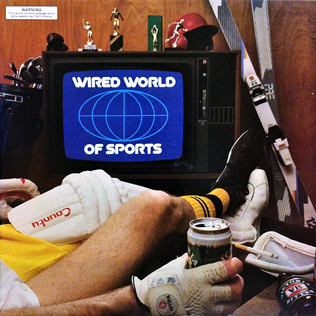
Wired World of Sports is the debut album released by The Twelfth Man. Released in 1987, it reached number one on the Kent Music Report in February 1988.
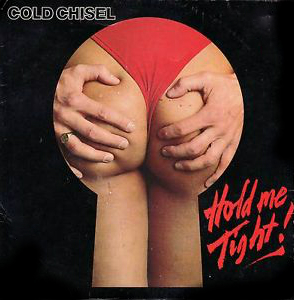
"Hold Me Tight" is a 1983 song from Australian rock band Cold Chisel, and appeared on the album Twentieth Century. Released as double A-side single with No Sense it reached number 14 in the Australian charts. Although the song charted, it failed to receive much radio airplay and didn't appear on any later greatest hits compilations.

"Wedding Ring" is a song written by Stevie Wright and George Young. It was originally recorded by the Australian rock group the Easybeats in 1965, whose version reached #6 on the Australian charts.
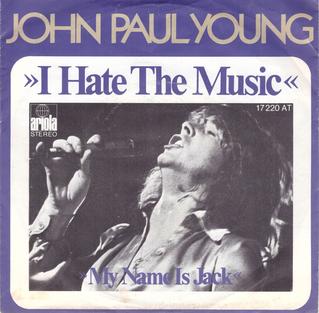
"I Hate the Music" is a pop song written by George Young and Harry Vanda and recorded by Australian pop singer John Paul Young. The song was released in March 1976 as the lead single from the singer's second studio album, J.P.Y. (1976). It peaked at number 2 on the Kent Music Report in Australia, remaining on the chart for 20 weeks. It was certified gold in Australia. It reached number 1 on the South African singles chart.
"Shadow Boxer" is a song by Australian hard rock group The Angels, released in June 1979 as the lead and only single from the group's third studio album, No Exit.

Out of the Blue is a four-track extended play by Australian hard rock band, the Angels, released in October 1979. "Out of the Blue" peaked at number 29 on the Kent Music Report Singles Chart.

"Don't Go" is a song by Australian pop group Pseudo Echo. The song was released in October 1985 as the lead single from their second studio album, Love an Adventure (1985). The song became the band's second top five single, reaching number 4 on the Australian Kent Music Report.
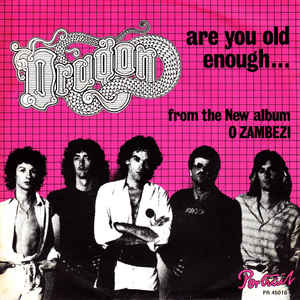
"Are You Old Enough?" is a song by New Zealand rock band Dragon, released in August 1978 while the band were still based in Australia. It was released as the first single from the group's fifth studio album O Zambezi (1978). The song peaked at number one on the Australian Kent Music Report, becoming the group's first number-one single.
"He's My Number One" is a pop song written by Terry Britten and B. A. Robertson and recorded by Australian pop singer Christie Allen. The song was released in January 1980 as the fourth single from Allen's debut studio album, Magic Rhythm (1979). The song peaked at number 4 on the Kent Music Report in Australia.
"Love and Other Bruises" is the debut single by English/Australian soft rock duo Air Supply, from their 1976 self-titled debut album. The song was a top ten hit in Australia, where it peaked at No. 6. The song also appeared on the duo's third album of the same name, which was their first release in the United States.
"All My Friends Are Getting Married" is a song by Australian band Skyhooks, released in June 1975 as the second and final single from the band's second studio album, Ego Is Not a Dirty Word. The song peaked at number two in Australia.












